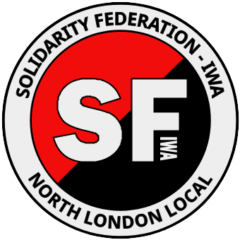Recommended Reading
If you would like to know more about anarchism and syndicalism, please see our recommended reading page here. Has links to both short introductions and more detailed theoretical and historical works, all available free online.
Practical Guides
Libom has a huge archive of guides that draw from the experiences of multiple organisations, that can be found here. These guides cover how to build a union, how to organise a rent strike, how to stay safe on demonstrations, how to handle the media, and much more.
Your Rights at Work
A guide to your rights at work can be found here, courtesy of the Solidarity Federation Hospitality Workers Union.
Flyers and Materials
This is a repository of the flyers created by members of the North London local, available ready to print here.
